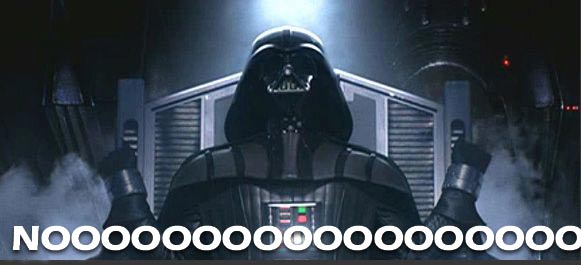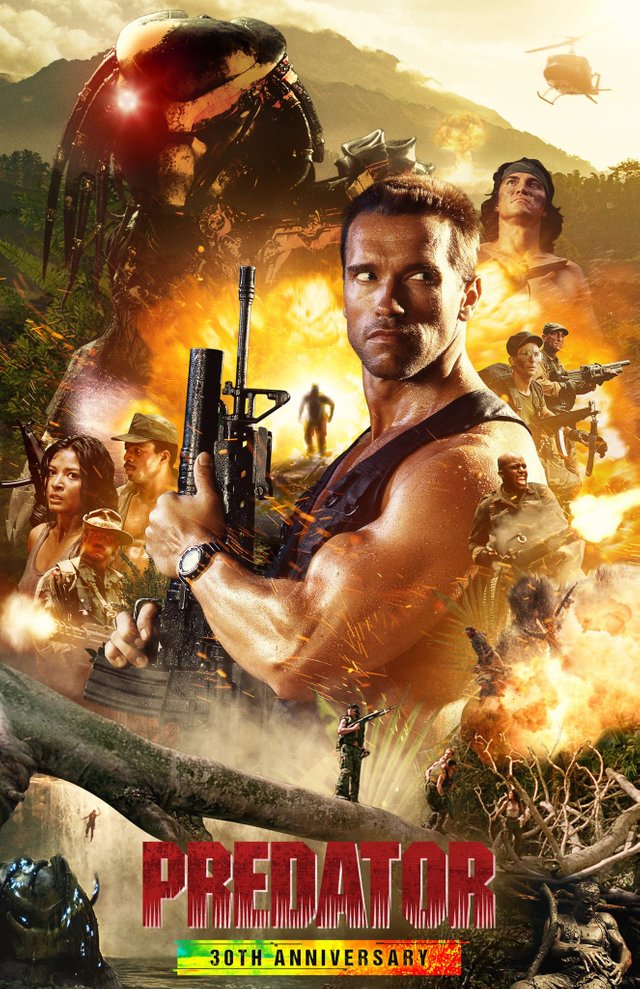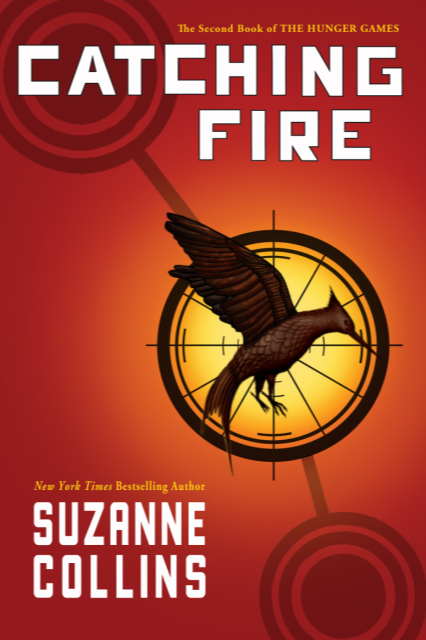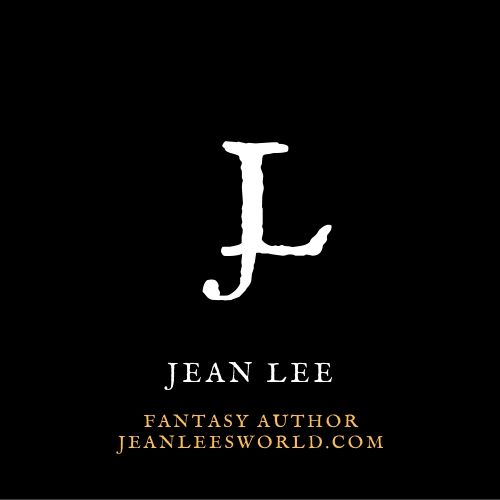You know the scene.
The kind that makes you go, “NOOOOOOOOOO!” because a beloved and/or cool character is about to die.
Every time. Seriously, every time I see Predator, I say, “Nooo, Billy!” at the screen. As a member of the audience, I’m invested in seeing the characters’ survival against the Predator. I want to see the characters’ skill sets aid them in overcoming the conflicts and obstacles that await them before the journey’s end.
This can be said as a reader of any high-stakes story, really. Look at a few big SFF series for examples. We want Captain Kirk and his crew to survive. We want Harry Potter and all his friends to survive. We want the Fellowship of the Ring to survive. We want Katniss Everdeen and her loved ones to survive. We want Luke Skywalker and his friends to survive.
We know these people are fictional, but there are facets of these characters that connect within us. This makes us care about them, so of course we go “NOOOOO!” when Dumbledore is struck down by Snape, when Prim and dozens of others are bombed by a device made by the Katniss’ oldest friend, Gabe.
And then…

…and then there are the deaths that just don’t feel necessary.
Now I just want to pause here that I’m talking about this as both a reader and a writer. I get that pain and consequence have to occur in a high-stakes story. You can’t threaten death without delivering at least a little bit of death or you risk hollowing out the stakes.
What bothers me as a reader and worries me as a writer are those unnecessary character deaths. You know you’ve encountered stories with this problem. That’s why I showed the aforementioned Predator clip of Billy. Billy, the biggest and buffest bad-ass of Dutch’s team, stops on the tree-bridge to face the Predator. Why?

On screen, we’re not given a reason apart from MANLINESS. Just look at him, stripping down and cutting his own chest. It’s the ultimate bad-ass standoff!
Only in the story, it’s not the ultimate bad-ass standoff. That’s for Dutch (also stripped down) and the Predator.
So why did Billy have to die?
As a “reader,” I could shrug to “noble sacrifice,” except no other death has bought the survivors time or advantage. Billy would know that. I could also shrug to “acceptance,” since earlier in the film Billy says, “We’re all going to die.”
But as a writer, I think I really know why.
It’s because you can’t have an ultimate bad-ass standoff between TWO good guys and a bad guy. Plus, in terms of physique, Billy and Dutch are an equal match. Heck, I think Billy could have beaten Dutch in arm wrestling.
So Billy had to die.

It feels like when there has to be a bit of death in the story, writers sometimes choose the character most similar to the protagonist. Take Finnick Odair from the Hunger Games trilogy: he’s strong, knowledgeable, another survivor of the Hunger Games (also: pretty). We meet him in Catching Fire, grow connected to his personality and backstory, root for him when he gets married….aaaaand watch him die on the assault on the Capital. Now it can be argued his arc’s complete, so the audience knows who he is. SOMEone’s got to die in a war; his death will have the strongest emotional impact while primary heroine Katniss can continue on.
Fine. Fair enough. At least Finnick got to die on page/screen, UNLIKE BILLY.
Notice how after all his bad-ass preparation, we never get to see Billy fight the Predator. We just hear his anguished scream, and know he’s dead. Such off-screen deaths drive me nuts. Harry Potter and the Deathly Hallows is guilty of this, too, both in book and on film, when it comes to characters like Professor Lupin and the Auror Tonks. They die during the battle at Hogwarts while Harry’s elsewhere, so we never see their final moments. They’re just dead.
Wow, I went off longer on this than planned. Dammit, Billy, you got me all wound up!
I get that I have to accept beloved characters dying. I just want those deaths to MATTER. You bet your ass I cry when Beth dies in Little Women. I bawl when Clint Eastwood’s character Walt is shot in Gran Torino. I refused to believe Hercule Poirot was really dead in Curtain until I went online for evidence to prove otherwise…and couldn’t find it. Even Dobby, that goofy little house-elf Dobby, had me sobbing both while reading and watching Harry Potter and the Deathly Hallows. I hated that these characters had to die.
But their deaths help spur the protagonists–and the narrative–forward. Without their deaths, there is less at stake; therefore, there is less concern for the characters.
Now I have waaaaaay more to say about character death, but Bo’s up and given me the giggles by saying, “Billy will always be in the chopper of your heart.” Yes, yes he will!
So let’s pause to talk. Is there a story with a character death that really frustrates you? Should I kill more characters in my own books?
Lastly, be sure to stay tuned to my monthly newsletter. Big changes are coming, and I don’t want you to miss out!
Read on, share on, and write on, my friends!


Don’t you think the death of a main character is a sort of marketing hook, especially in video. Like Games of Thrones where they kill off main characters and still keep the audience glued? ~ George
LikeLiked by 2 people
Oh I do think that’s a big part of it, yeah. Comics do that a LOT–heck, that Infinity War movie killed HALF of all the superheroes. But in the comic universe, death hardly matters–sure, they’re dead *now* but some sort of magic or time reversal will bring them back. I’ll give Game of Thrones this much: when they kill someone, they kill’em for good. 🙂
LikeLiked by 2 people
I am inclined to agree with every astute word you’ve written here, Ms Lee…I prefer it to The New Fool, purely because unlike this Old Fool, you’re not foolish!…save for one character, namely Harry Potter who, in my minority view should have copped it within the first few minutes of the first film. Super post, notwithstanding the ‘Potter point’.
LikeLiked by 2 people
(sides split laughing) Oh my goodness, you bring up ANOTHER great point for a future character death article: hero-killing. LOVE IT. I’m saving this bit, Master Steeden, and tip my hat to you, for you are The Master, always. 🙂 xxxxxxxxxxxx
LikeLiked by 2 people
It is quite the strangest thing. My dear wife has likely watched the Potter movies ten times over, plus the same with the books. She loves them, although to me from the opening scenes from the first movie I could predict…for the main part…what would happen next. Am I a Philistine? Most think so!
LikeLike
As a writer, you gave perfect justification for Billy’s death. A viewer may ot agree with your assessment. But your points were valid. Billy’s death promises us a greater finale.
LikeLiked by 1 person
Thanks. Yes, I get why he has to go, but it doesn’t mean I have to like it. 🙂 Of course, now I’m thinking that had they let him live, he could have been the protagonist in the sequel instead of Danny Glover…though chances are they would have pulled a Friday the 13th Part 2 and kill him off in the opening sequence…(sigh) Why Billy, whyyyyyy?
(ahem)
Sorry. Got a little carried away there.
LikeLike
Good points, Jean. Deaths happen needlessly all the time: life isn’t fair, the good too often die young, unfortunately. But we want something different from fiction, don’t we.
Yes, we need to relate, and for that to happen fiction needs to reflect everyday life. But we are also narrative-loving organisms: we want a beginning and end to our middle, and a point to our story, just like we want a point to Life, the Universe and Everything.
A slice of real life reflected back at us is no guarantee that it has any significance beyond what we see. And if we, as cogitating creatures, want anything more from life it is the answer to ‘What’s the point?’ otherwise we’d all be existentialists. Needless, pointless deaths make no sense to us in everyday life, so why should they in fiction?
LikeLiked by 3 people
YES. Yes, yes to all of this, thank you! You’re making perfect points to bring up when I discuss more about the pointless deaths for plot contrivances. Can you tell this storytelling element really gets my goat in the craw with the bees and bonnets and pajamas on cats, etc etc etc? Saving this comment….
LikeLiked by 2 people
Oooooo, you’ve hit on one of my pet peeves, now! Yes! Yes of course it hurts when a beloved character dies, but if the author doesn’t make it *matter* then I get so frustrated and angry! I dislike it happening off-stage too, but the worst is when the other characters don’t respond to it naturally — as though I cared more about this guy better than his actual friends did.
That happened to me recently with a book I otherwise liked. Not only did the character’s death not feel necessary or complete (it was done in a way that I thought maybe he wasn’t going to stay dead… but no, I guess he was), but then the MC didn’t seem to react emotionally to it at all, or do anything magical to try to bring him back (which had worked in a previous scene) or even mention/think about it, even though the dead character was a close friend and love interest. Argh!!! It was as if the author had written the characters into a corner with this love triangle and poof, here’s an answer, all taken care of. ((brushes hands off))
It’s a good cautionary tale to remember in my own writing, that’s for sure.
LikeLiked by 4 people
YES EXACTLY! Oh man, I love this comment thread, because *you* now bring up another fantastic point/problem with character death: the aftermath. I just saw the movie SOLO (yeah, that Star Wars wannabe movie) and felt this way on sooooooo many levels. Two characters die in a heist halfway through the movie, and it’s like their deaths never mattered. After a momentary sad chord from the orchestra and “NOOOO!” from Woody Harrelson, all the heisty stuff just keeps on going. Heck, Woody, the guy who was supposed to love the chick that died, never once looks like he’s mourning the love of his life. WHAT THE F***!!!!!!! Ahem. Getting riled up again…
LikeLiked by 2 people
Oh, GRRRR that scene in Solo would have driven me crazy too! In the book I was just mentioning, there’s a point in the next chapter where the MC notices the BODY of her friend/maybe love interest lying there waiting to be taken away and I thought, okay, this is where what happened really hits her! But nope, no reaction at all, the narration just immediately moves onto the next thing in the next *sentence* and she’s worried about some other fairly minor issue, as though she had just glanced at a broken chair or something. There is a BODY ON THE GROUND. Someone you CARED ABOUT. Argh!
LikeLiked by 2 people
Jeeez! Pretty sure I’d have thrown the book at the wall at that point!
LikeLiked by 1 person
I believe I set it down not-very-gently and walked away in a huff. But then I got a glass of wine and returned to see what happened next. 🙂
LikeLiked by 1 person
Ha! Sounds right. 🙂
LikeLiked by 1 person
Even Predator, an action schlock movie like Predator, clearly changed mentally and physically when his best friend’s chest got blown out. If the “mindless” schlocky movies can get it right, then so can we!
LikeLiked by 1 person
Good point!
LikeLiked by 1 person
I think we need a few deaths to up the stakes, show the stpry can go anywhere xxx
LikeLiked by 1 person
Indeed! And yeah, I’m one of those who hates killing characters because I’m always thinking of how they can be used elsewhere, but unless a threat asserts itself, then it just stops feeling like a threat. And where’s the fun in reading about a toothless threat?
LikeLiked by 2 people
There’s no fun. A threat is a threat. End of. People can’t go up against the big guns and come out unscathed, or be labelled ruthless warriors and then be pussy cats. On another level life doesn’t always end happily with rose tinted sunsets. xx
LikeLiked by 1 person
We LIKE our sunsets! But you’re right–tension-less storytelling isn’t storytelling at all.
LikeLiked by 1 person
Abso. Think when a main gets written out of a series, then you know everyone is up for grabs that way. So when the remainers are cornered or in a tricky sit, then yeah you know they could get killed off. So abso agree. I body counted a bit in Judas Bride cos I was not going to make a ruthless hero and what the heroine is risking, otherwise. And I wrote out a Starkadder Sisterhood secondary at the end of Splendor cos these women, given what they were from and how they had lived, were not all going to make it. So a blog post close to home here.
LikeLiked by 1 person
Oooooh, yes! this is a point I want to bring up, too: when a major character’s taken out, then ANYthing is possible. Jotting down your note. 😉
LikeLiked by 1 person
I killed one character in Welcome To The Valleys, it sucked.
I disagree about Lupin and Tonks, though. Harry not being there when they died helped steel his resolve to accomplish the task ahead. And he and Lupin did have a moment where Harry got to express his sorrow.
Sent from my iPad
>
LikeLike
Reblogged this on M J Mallon YA/Paranormal Author and commented:
Jean Lee is talking about #characterdeath on her blog
LikeLiked by 1 person
Hi Jean.
Doyle killed off Sherlock Holmes, but had to bring him back eventually due to public outcries.
LikeLiked by 1 person
True. I need to add that to another post–like the death of Superman, the hero too beloved to die.
LikeLiked by 1 person
Hi Oh Wise One. I remember shouting in the cinema “Billy will you just duck” followed by a disgruntled shout “told you so”. I always think in life main characters die sometimes late sometimes really early. Sometimes for a purpose, sometimes randomly. I quite like it when books try some of this unpredictable life stuff. But certainly not if it involved Captain Kirk, Obi-won or Captain America (I’ve got my beady eye on Thanos).
LikeLiked by 2 people
Wise? Oh heavens, I am many things, but rarely wise. 🙂
Indeed! I’ve lost track of all the super hero movies. As for Star Wars……ooooooh, I’m going to have some choice words to say about the new saga’s storytelling, but Obi-Won and Yoda add a unique flavor to character death: killing characters but bringing them back in a limited capacity.
LikeLiked by 1 person
Definitely wise.
LikeLiked by 1 person
This morning, I’m too tired to argue. 🙂
LikeLiked by 1 person
Strange how one of the greatest most powerful yedi Master Windu can’t come back or even fly to save himself. Even non Jedi can fly in space in the new one…. maybe money and pay effects the storyline.
LikeLiked by 1 person
Yeah, no kidding! And the ridiculousness of it, keeping alive the one OT cast member who’s ACTUALLY DEAD. Just….Disney, you dumb &#*@^%^#*@#(@(!&$^#%)#
LikeLiked by 1 person
If you can’t argue then it must be correct. Sorry your tired. We watched a few of the clone war cartoon series. Just so much better than anything Disney has done with the franchise. Then they even canned that. Replaced it with just a poor carton imitation. But I see they have sort of decided to bring the old one back. I think they should approach a new writer to bring life back into the franchise, are you free?
LikeLiked by 1 person
HA! I would be awful working with an established universe because I’d just go to an uncharted corner and make up my own stuff. 😉
LikeLike
Yes, the character of Sonia in my own novel, “Oil and Water.” It killed me to take her out, but it had to be done for the sake of the work. :0) Have a peachy day, doll. xo
LikeLiked by 2 people
Yes, true! I have that in a WIP. I hate killing characters, but it’s the only way to move both the narrative and the other protagonists forward. We *must* witness this death.
And I need to email you–your interview will be posted this month! 🙂
LikeLiked by 1 person
👌👍😘
LikeLiked by 1 person
I hate it when major characters die and I especially hate it if they are thrown away. But I am perfectly capable of killing them off – I just hope it isn’t seen as throwing them away… And there are two major reasons – one is as the action picks up and I want to streamline the pace it helps to shed a main character and the second reason is that it massively ups the stakes. When an author offs a crucial character, then I pay close attention for the rest of the book, because I can’t take anything for granted – I hope that’s the reaction I elicit from my readers, too.
LikeLiked by 2 people
Excellent points! Let me mark these down–especially when it comes to pacing and streamlining cast–just like Predator! Anyhoo, your pacing point is so true. Not only does a death up the stakes, but fewer characters means writers can spend more time on action and moving the narrative forward. I shall take note of your comment for the next post–gosh, I’m loving all this!
LikeLiked by 1 person
I’ve thoroughly enjoyed following the discussion, Jean – really useful stuff all through the thread:))
LikeLiked by 2 people
A fabulous discussion, by the way, Jean…:)
LikeLiked by 1 person
Thanks! And thanks for participating 🙂
LikeLiked by 1 person
What a thoughtful summing up. Lots of useful tips on something that it’s so easy to get wrong.
Which deaths irritate me? Well, it’s not so much in books, as on screen, and hopefully these days less usual to see. I mean those dramas when you can pick out who who will be ‘knocked-off’, pretty much from their introduction, because of their race or gender. A lot of the old ‘B’ movies and detective series were extremely lazy about the introduction of ‘canon fodder’ characters. It’s such a shame, because some of these stories were otherwise entertaining.
LikeLiked by 2 people
Ah, the cannon fodder. You made me think of Star Trek and the “Red Shirts”–the unnamed, not-main-cast members of a security team that come with the main characters whenever they beam down onto a planet for security purposes. Hands down, those people are going to die, every time. Is there another movie you’re thinking of? Because I only have Star Trek in my head now. 🙂
LikeLiked by 1 person
Lots of old nameless B movies from the 40s, 50s and 60s that we used to watch on weekend tv, especially anything with cowboys, murderers or science fiction. Especially the kind where we shouted, ‘for goodness sake, turn the light on.’
LikeLiked by 1 person
Ha! Oh yes, characters being dumb so they can die, or characters bound for death so the hero can look good. The Dirty Harry movies come to mind.
LikeLike
Hi oh wise one. I got tagged to write a story or poem. Yes me. Had a go. It’s not really something Ive done before. I set a really low bar level with my quite joyful dittie. Please don’t shout at me. I tagged you to do maybe do something. Please please ignore if you don’t fancy it. Should have asked first – sorry.
LikeLiked by 1 person
Oh for heaven’s sake–don’t worry! I may be many things, but one thing I am NOT is a poet. So, don’t you feel any pressure of any kind. Now I’m off to read it…
LikeLike
Ah Dobby, I cried when he died… I can understand why Rowling did it. I know that some people, fictional or real, only get a message after somebody like Dobby gets killed. But it is boring, so boring and predictable, and yes, irritating. The same as some other deaths in the Deathly Hallows. Drives me nuts, too 🙂
LikeLiked by 1 person
Dobby’s an excellent example. He makes a noble sacrifice, and he’s honored. I cried reading his death and watching it, too. But those off-screen deaths really get me, especially when they’re with characters we’ve known for several books. Grrrrrrrr…..
LikeLiked by 1 person
Yes, at least he got a proper burial.
LikeLiked by 1 person
Pingback: #writerproblems: #characterdeath in #storytelling (Part 2: melting shoes and raising stakes) | Jean Lee's World
I’m afraid we didn’t see the fight between Billy and the Predator mostly because there wasn’t as much a fight as a slaughter. Indeed, characters dying can be quite an impact. The series that might have given me the hardest strokes of that kind is probably Game of Thrones. I’m quite impressed the author builds such extremely deep and real characters just to murder them in cold blood… But I like it, though. I like it.
LikeLiked by 1 person
Oh, I suppose that’s true. I guess I grow to expect more from Billy because he’s the tracker. He’s the first of the group to “sense” the Predator. But you’re right the Predator slaughters everyone he comes across…except Arnold, because he’s Arnold.
And I’m all for slaughtering characters SPOILER: The first book of Mortal Engines did a brilliant job of this, too. The movie changed way too damn much.
LikeLike
Hehe, no one slaughters Arnold… Except Sarah Connor. Because she’s Sarah Connor
LikeLiked by 1 person
YES!
LikeLike